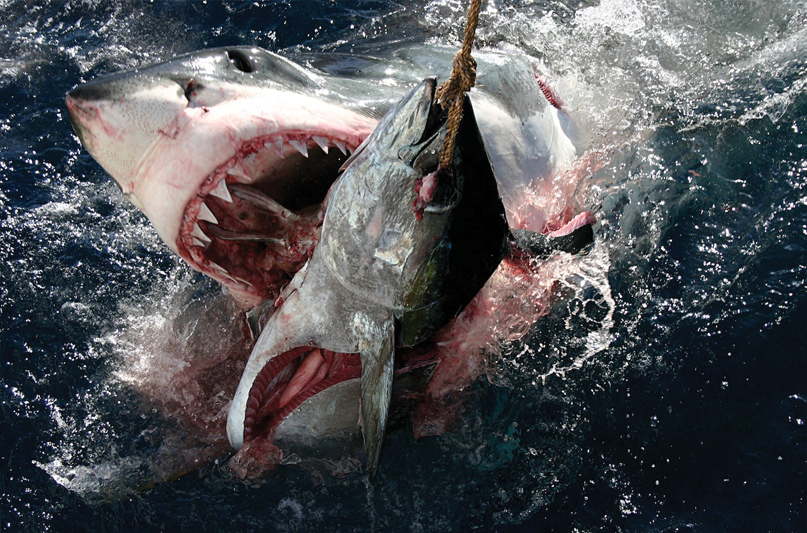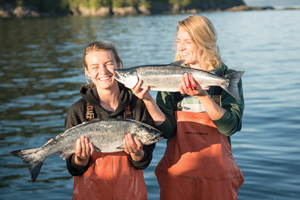November is a down time for big water fishing in the Northwest, but it’s still a good time to give thanks for the opportunities we do have. Don’t winterize that fishing boat! There are still fish to be caught, especially in Southern Puget Sound.
When it comes to blackmouth fishing in the Sound, tactics and terminal tackle are simple. These 5- to 15-pound salmon are on the feed, so finding bait is key. Most hot spots will be on points, banks, and bars. Smaller spots around ledges can be productive places to find salmon as well.
One of the main bait fish in the diet of resident Chinook is sand lance or candle fish. This prey is found on the bottom. Whether downrigger trolling or jigging, most salmon will be within 10 inches of a sandy floor. Don’t be afraid to bounce your downrigger balls in the mud or sand to entice a strike.
Use lures such as Silver Horde Coho Killers or Ace Hi Flies when trolling to mimic the baitfish that blackmouth are feeding on. Tie these on 36’ to 48’ of leader behind and 11” flasher. Feeder Chinook are voracious and the bite can be fast and furious around the tide changes. They are also very good on the BBQ or in the smoker, and provide a good change of pace around the holidays for dinner, dip, or gifts.
Fishing for squid can be a fun and productive pastime in Puget Sound this time of year. This is mostly a nighttime activity and can be done from public piers or by boat. Squid are attracted to light, so taking advantage of existing lighting or creating your own light source with spotlights or underwater lights can be effective. Squid jigs are available at most tackle stores in the region and are easy to use. When you’re at your local store picking up gear, also ask them for tips on how to catch them.
As a simple primer, cast out to the edge of whatever light you are using and let the jig fall. Then twitch and reel in until the lure is back to you. Keep pressure on the line when bringing the lure back in to keep the squid from releasing its grasp and getting away. Most lighter rods and reels will work fine for squidding. These cephalopods sure do make good eating. Calamari is one of the best dishes to prepare after you get a daily limit between 5 quarts to 10 pounds. A great appetizer for Sunday football is fresh squid caught on Saturday night! Additionally, crabbing should be open in many areas of Puget Sound and the San Juan Islands through December 31. Nothing better than fresh Dungeness around the holidays.
While not a November fishing opportunity in the Northwest, one interesting species for this slower month we can touch on is the shark. In mid-September, I went on a cage diving expedition for the great white shark off Guadalupe Island, Mexico. If you ever have the opportunity to do this, don’t hesitate! For those of us who saw the movie Jaws as kids and have been fascinated by sharks ever since, this is a life-fulfilling trip. I went on the 112’ Solmar V out of Ensenada. From beginning to end, the vessel, crew, company, food, and beverages were all top notch. And the great whites? As awe inspiring as you would guess.

Guadalupe Island is an 18-hour steam from port. We left at mid-day and arrived the next morning. Upon waking and looking out the stateroom port hole, what struck me was the beautiful color of the deep blue water. Guadalupe is known for its clear waters and long-distance visibility, making it a top-tier destination for viewing great white sharks. The next three days were spent in the water and on the sundeck viewing one of the most amazing apex predators on the planet. A razor-sharp spear of evolution honed through millennia. The sharks are battered but beautiful. They make a living the hard way, and that face full of fangs is all business.
There are many different species of sharks in Northwest waters. From the sometimes too plentiful spiny dogfish to the big, bad great white. Sighting of white sharks have increased off the Washington and Oregon coasts in the last few years due to the exploding populations of pinnipeds in our waters. A white shark was even spotted killing a seal in the Columbia river last year. Great whites would probably be more numerous in areas like Puget Sound and the San Juan Islands if it weren’t for their only natural predator–the killer whale. But rest assured, these sharks are still rare in our waters.
Check your local regulations before keeping sharks, but some do make good table fare and can provide good fighting sport on rod and reel. Fishing, retention, and possession of great white, six-gill, seven-gill, and thresher sharks is banned in Washington.
We had a good summer salmon fishing season to be thankful for in many areas of the Northwest. Even though the migrating fish may have moved through, it doesn’t mean you should migrate off the water. If you live in the area surrounding the South Sound, there are still fun times to be had. Getting creative and gaining local knowledge of shoulder season opportunities can pay off with the seafood you catch. Until next time, get off the couch, get out there, and go get some!
